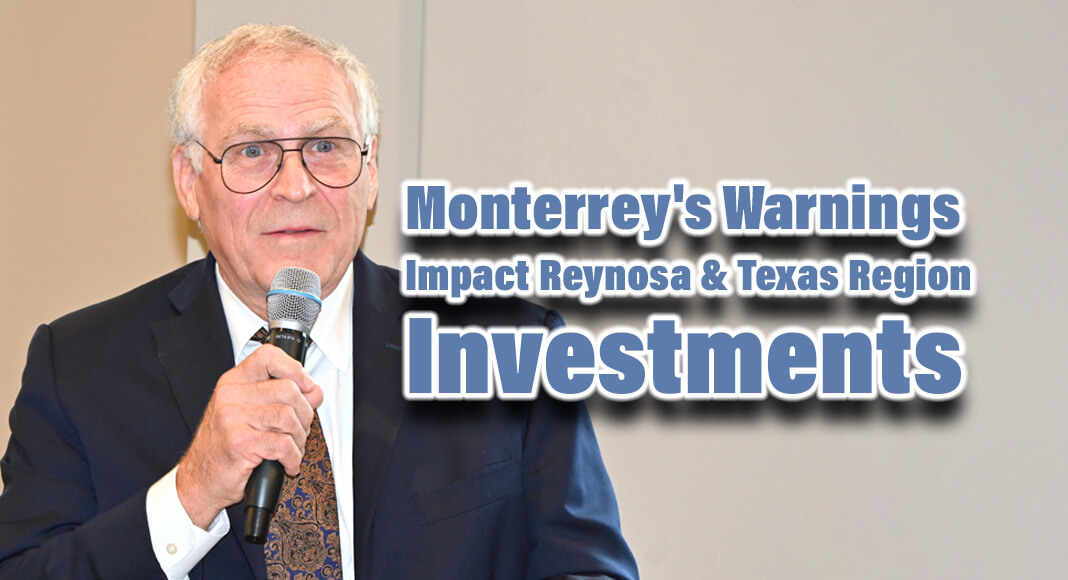
Texas Border Business
By Roberto Hugo González
The McAllen Citizen League, a nonprofit organization and community engagement, is committed to the principle of neutrality; this organization diligently works to ensure public access to essential information that holds substantial interest for the community. The league promotes a deeper understanding of local issues and developments by hosting informed guest speakers and facilitating open discussions.
Recently, the league welcomed Keith Patridge, the President and CEO of the McAllen Economic Development Corporation (MEDC), and the McAllen Foreign Trade Zone. With over 36 years of experience, Keith has assisted companies with binational startup operations in McAllen and its Mexican counterpart, Reynosa. His extensive experience offers valuable insights into the unique challenges and opportunities of operating in this cross-border region.
Keith’s presentation to the Citizen League demonstrated his deep connection and commitment to the area. “Speaking to the Citizens League here is always a pleasure. It’s been quite a while since I’ve had that opportunity, so thank you very much for it,” Keith remarked.
The focus of his talk was twofold: a look back at the MEDC’s historical activities and an overview of its current and future initiatives. Keith outlined the MEDC’s strategic planning process, which was conducted in collaboration with the city of McAllen and spearheaded by Mark Garcia, the executive vice president of MEDC. This plan, which engaged various community stakeholders, sets the course for the organization’s future direction.
Highlighting the MEDC’s historic achievements, Keith shared impressive statistics: since its inception in 1988, the organization has recruited 726 companies to McAllen and Reynosa, facilitating nearly 900 expansions and creating over 244,000 jobs. These companies now occupy 58 million square feet of building space in both cities. These figures prove their efforts and show the MEDC’s significant impact on the local economy.
Keith also addressed the MEDC’s current activities, noting the ongoing work with 23 companies and the detailed, up-to-date tracking that is critical for effective business engagement. He emphasized the community’s challenges, citing “storm clouds” that may require collective efforts to navigate.
Keith’s extensive update sheds light on the complex dynamics of regional development, cross-border industrial activity, and the bigger socio-political context affecting business operations in areas like McAllen and Reynosa. By managing a constantly updating database, his organization ensures continuity and adaptability in handling projects that might go dormant or slow down. The interaction with a range of companies—this month counting 23—highlights the vigorous activity and potential for economic growth, highlighting by the significant employment figures: over 2 million square feet of space and nearly 1,700 jobs.
The geographical and international dynamics are particularly intriguing. With most companies showing interest in the U.S. and a notable few drawn by the twin plant concept in both the U.S. and Mexico, the transnational economic interaction is vivid. The direct investment in Reynosa alone, amounting to over $142 million, emphasizes the scale and impact of these projects. Keith also notes a diverse international presence from the U.S., Spain, Mexico, and China, reflecting a global interest in the border regions’ economic opportunities.
The pandemic has shifted some economic patterns, with an increasing number of Mexican companies seeking to establish their initial U.S. presence in McAllen. This “beachhead” strategy suggests a strategic recalibration and enthusiasm for tapping into the U.S. market despite global uncertainties, including political tensions and economic instability, which Keith mentions influence the pace of decision-making among the companies.
Keith continued, “You’re probably aware of the increasing trends in reshoring and nearshoring. Unfortunately, these aren’t significantly manifesting at the US/Mexico border. So, why is this the case? Frankly, a lot of it comes down to our reputation. We’ve been contending with violence in the border area for about 16 years now. Recently, we’ve also been grappling with migration issues, which are frequently highlighted in media coverage—often in a negative light due to associated problems like drug trafficking. Consequently, the most common initial question we encounter is about safety: ‘Is it safe there?’ This concern is something many of you might have heard or been asked about directly. Addressing these safety concerns is a major challenge for us. Additionally, today at our board meeting, I raised another concern: How familiar are you with the State Department’s travel advisory?”
Keith highlighted the persistent challenges faced by regions with unfavorable reputations due to security concerns, particularly as exemplified by recent events involving a potential investor in Reynosa. He pointed out that the State Department’s travel advisories, which include a “Do Not Travel” designation for six Mexican states—one being Tamaulipas, directly affect business decisions and perceptions of safety. Keith recounted a telling incident within the last month involving an automotive company considering a location on the border to serve both U.S. and Mexican plants.
The company initially expressed interest in Reynosa but was discouraged by warnings about safety issues from business contacts in Monterrey. Despite these concerns, Ralph Garcia from Keith’s office persuaded the company representative to visit Reynosa. After spending a day there, the representative felt the safety concerns were not unlike those in major U.S. cities like Philadelphia or New York and decided to pursue setting up operations. However, the decision was overturned when a major customer threatened to withdraw their contracts should the company proceed with the Reynosa location due to the travel advisory status. Consequently, the company opted to set up in Monterrey instead.
Keith emphasized that while safety is a genuine concern, it is also a common challenge across various industrial regions in Mexico, not just those with travel advisories, including Monterrey. He stressed the importance of addressing these perceptions and realities head-on, underscoring that such challenges are crucial for Reynosa and similar areas across the country. As he was signaled that his time was up, it was clear that these issues were pressing and required continued attention and action from local leadership and international stakeholders to ensure the region could realize its full potential as a strategic economic hub.














